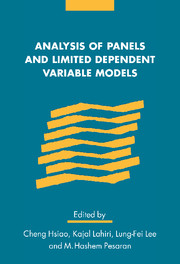Book contents
- Frontmatter
- Contents
- List of contributors
- Foreword
- Introduction
- 1 A note on left censoring
- 2 Autoregressive models with sample selectivity for panel data
- 3 Mixture of normals probit models
- 4 Estimation of dynamic limited-dependent rational expectations models
- 5 A Monte Carlo study of EC estimation in panel data models with limited dependent variables and heterogeneity
- 6 Properties of alternative estimators of dynamic panel models: an empirical analysis of cross-country data for the study of economic growth
- 7 Modified generalized instrumental variables estimation of panel data models with strictly exogenous instrumental variables
- 8 Expectations of expansions for estimators in a dynamic panel data model: some results for weakly exogenous regressors
- 9 Re-examining the rational expectations hypothesis using panel data on multi-period forecasts
- 10 Prediction from the regression model with one-way error components
- 11 Bayes estimation of short-run coefficients in dynamic panel data models
- 12 Bias reduction in estimating long-run relationships from dynamic heterogeneous panels
- CV of G.S. Maddala
- Index
2 - Autoregressive models with sample selectivity for panel data
Published online by Cambridge University Press: 22 September 2009
- Frontmatter
- Contents
- List of contributors
- Foreword
- Introduction
- 1 A note on left censoring
- 2 Autoregressive models with sample selectivity for panel data
- 3 Mixture of normals probit models
- 4 Estimation of dynamic limited-dependent rational expectations models
- 5 A Monte Carlo study of EC estimation in panel data models with limited dependent variables and heterogeneity
- 6 Properties of alternative estimators of dynamic panel models: an empirical analysis of cross-country data for the study of economic growth
- 7 Modified generalized instrumental variables estimation of panel data models with strictly exogenous instrumental variables
- 8 Expectations of expansions for estimators in a dynamic panel data model: some results for weakly exogenous regressors
- 9 Re-examining the rational expectations hypothesis using panel data on multi-period forecasts
- 10 Prediction from the regression model with one-way error components
- 11 Bayes estimation of short-run coefficients in dynamic panel data models
- 12 Bias reduction in estimating long-run relationships from dynamic heterogeneous panels
- CV of G.S. Maddala
- Index
Summary
Introduction
Recent studies have developed econometric procedures for the analysis of the time series properties of panel data sets consisting of large numbers of short individual time series (e.g., Anderson and Hsiao (1981), Chamberlain (1984), Holtz-Eakin, Newey, and Rosen (1988), and Arellano and Bond (1991)). The analysis is typically based on empirical autoregressive equations including time and individual effects, and possibly observed time-varying exogenous variables. Individual effects are removed by differencing and lagged variables are used as instruments in order to retrieve consistent estimators of the autoregressive coefficients of the levels equation. Alternatively, one could choose moving average processes and components of variance to model the autocovariance matrix of the data in first differences, using methods of moments estimation and testing as well (as done, for example, by Abowd and Card (1989)). In either case, the motivation for this type of analysis with micro data is often to establish a mapping between the observed dynamic interactions and those implied by a theoretical model, or at least to test particular time series implications of such model.
The purpose of this chapter is to formulate procedures for the analysis of the time series behavior of panel data subject to censoring. We apply these methods to analyze the dynamics of female labor supply and wages using PSID data. We follow the standard latent variable approach to models with selectivity and assume a linear autoregressive model for a latent variable which is only partly observed due to a selection mechanism.
Information
- Type
- Chapter
- Information
- Analysis of Panels and Limited Dependent Variable Models , pp. 23 - 48Publisher: Cambridge University PressPrint publication year: 1999
Accessibility standard: Unknown
Why this information is here
This section outlines the accessibility features of this content - including support for screen readers, full keyboard navigation and high-contrast display options. This may not be relevant for you.Accessibility Information
- 20
- Cited by
